A walk through the Georgia General Assembly by Michael Czajkowski
In January of 2023 I went to the Georgia State Capitol.
This may seem ordinary, but what you don’t realize is that I am just some person. I am not a politician. I barely call my representatives, but I do share things on Instagram. My support is community building. I attend protests, marches, do a little organizing. I do my little part, but I am not a Capitol person. I am not a lawyer. I am not a lobbyist. I am an origami physicist. I do not feel like I belong at the Georgia State Capitol.
But meanwhile the largest blackwater swamp in North America is under threat, PFAS and harmful bacteria are in our water sources, toxic rotting chicken parts are being dumped on farms, and there is a growing sense of unease about the lack of transparency. So now is a good time to start trying to influence politics at the Capitol. You might feel, like me, that any real chance at influence into national politics has slipped away, but state level change is still completely realistic and tangible. So it’s good to be ready to go there in person. It is good to see how it works. So there I was.
Anyway I went to the capitol on this day because I was invited by the Science For Georgia Executive Director, Amy Sharma. She is an expert in the art of being at the Capitol. I have seen pictures of her inside the Capitol, shaking important hands, posing for important pictures. She belongs here. (editors note – everyone belongs at the Capitol – and fake it till you make it!) This is very helpful, and is our first lesson:
LESSON 1: Find someone who knows their way around.
Our goals in being at the Capitol that day were to attend a few important sessions, with names that thus far had felt uninformative to me: A committee hearing on literacy, an environmental subcommittee roundtable, the GWC morning call. I don’t know what these things are. Attending them was more Amy’s goal than mine. My goal was to survive the day, to not break any laws, to not disgrace the name of “Science for Georgia” and maybe leave at the end of the day knowing more than when I started.
Here is how it went:
If I am being perfectly honest, I didn’t know what to wear. What’s the vibe? Should I wear a shirt and tie? I don’t really wanna wear a shirt and tie, as my gender identity doesn’t really mesh with that “man stuff”. But I also felt discomfort at how it would look to dress completely femme, which is more my fashion of comfort in formal moments. What I landed on was: white shirt buttoned all the way up, no tie, a long overcoat made from felt and formal tuxedo slacks. It felt like femme dressed up in a man’s world. I felt enough like me to feel confident. This approach turned out well. So that’s lesson two: it’s not black tie, but wear something nice that you feel comfortable in.
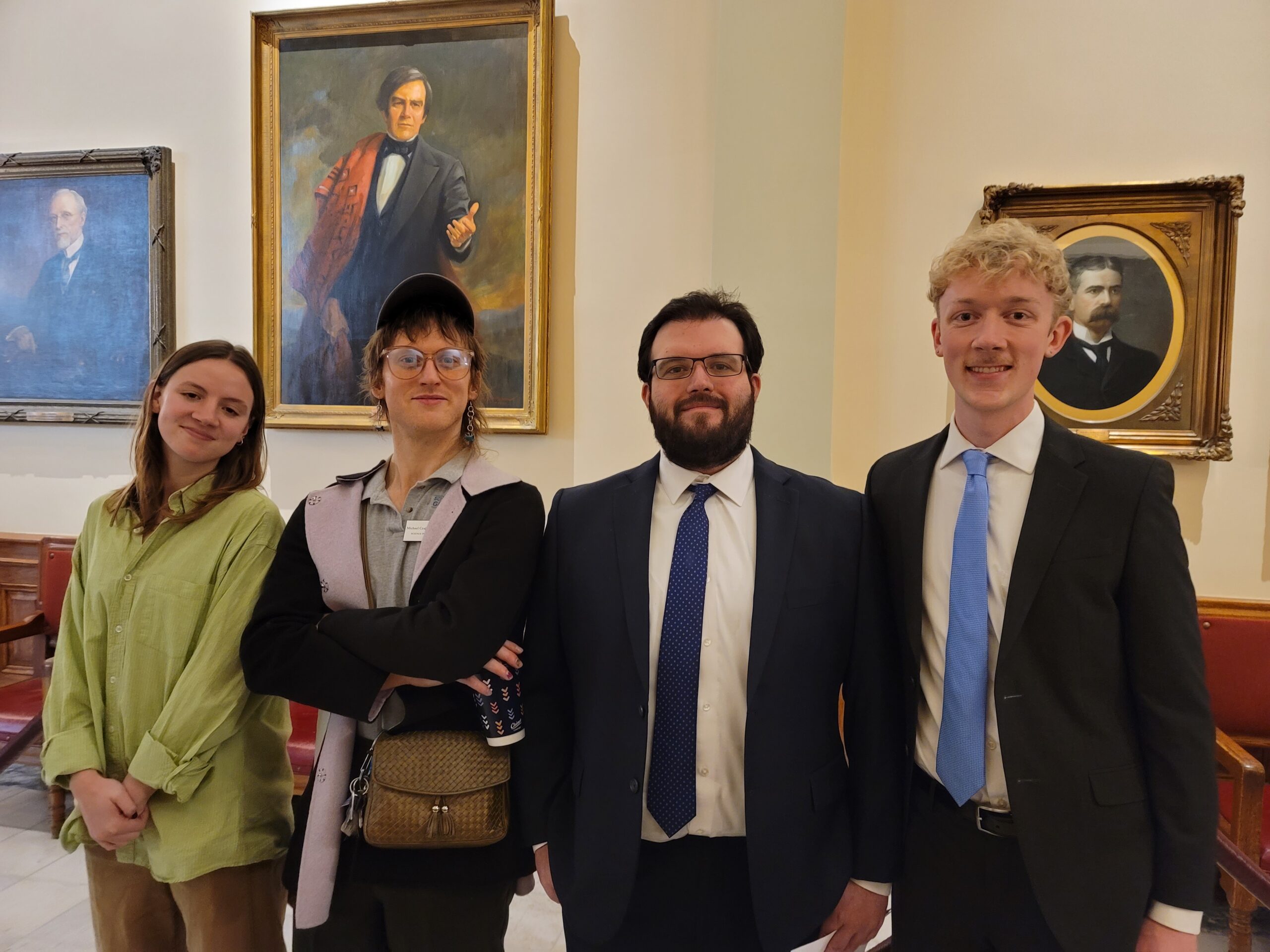
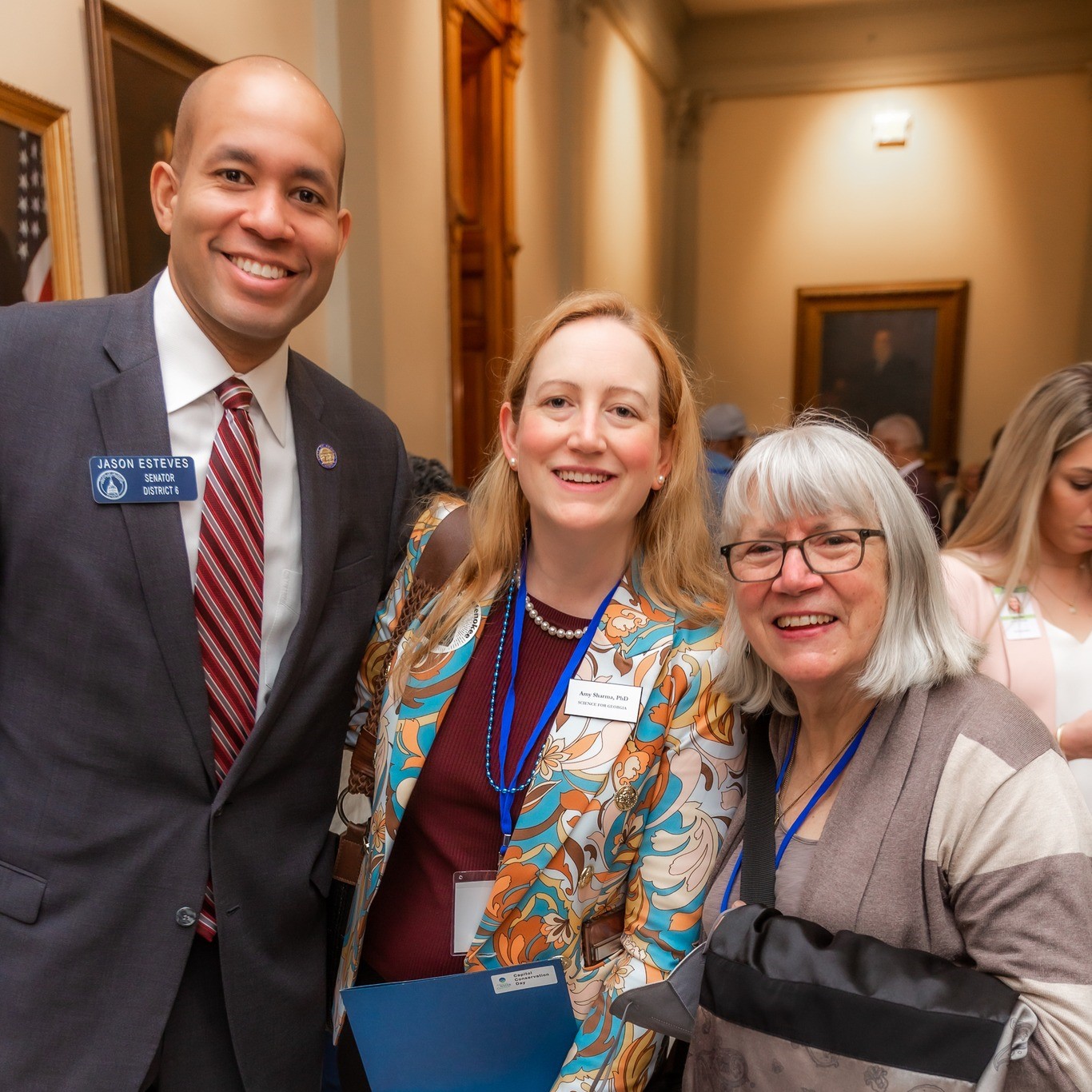
Anyway, maybe you can tell this article isn’t about politics. This article is about the little unspoken ingredients to feeling comfortable in a very foreign space. This article will prepare you to know where to park, where to sit in your down time, and not feel silly or even worse… creepy. And which places you can walk into without someone saying “who are you?” or “press badge” or “you can’t be in here” or some other scary phrase.
So, right off the bat, Amy told me where to park. This gave me a substantial amount of confidence. Step one of this day is mapped out for me.
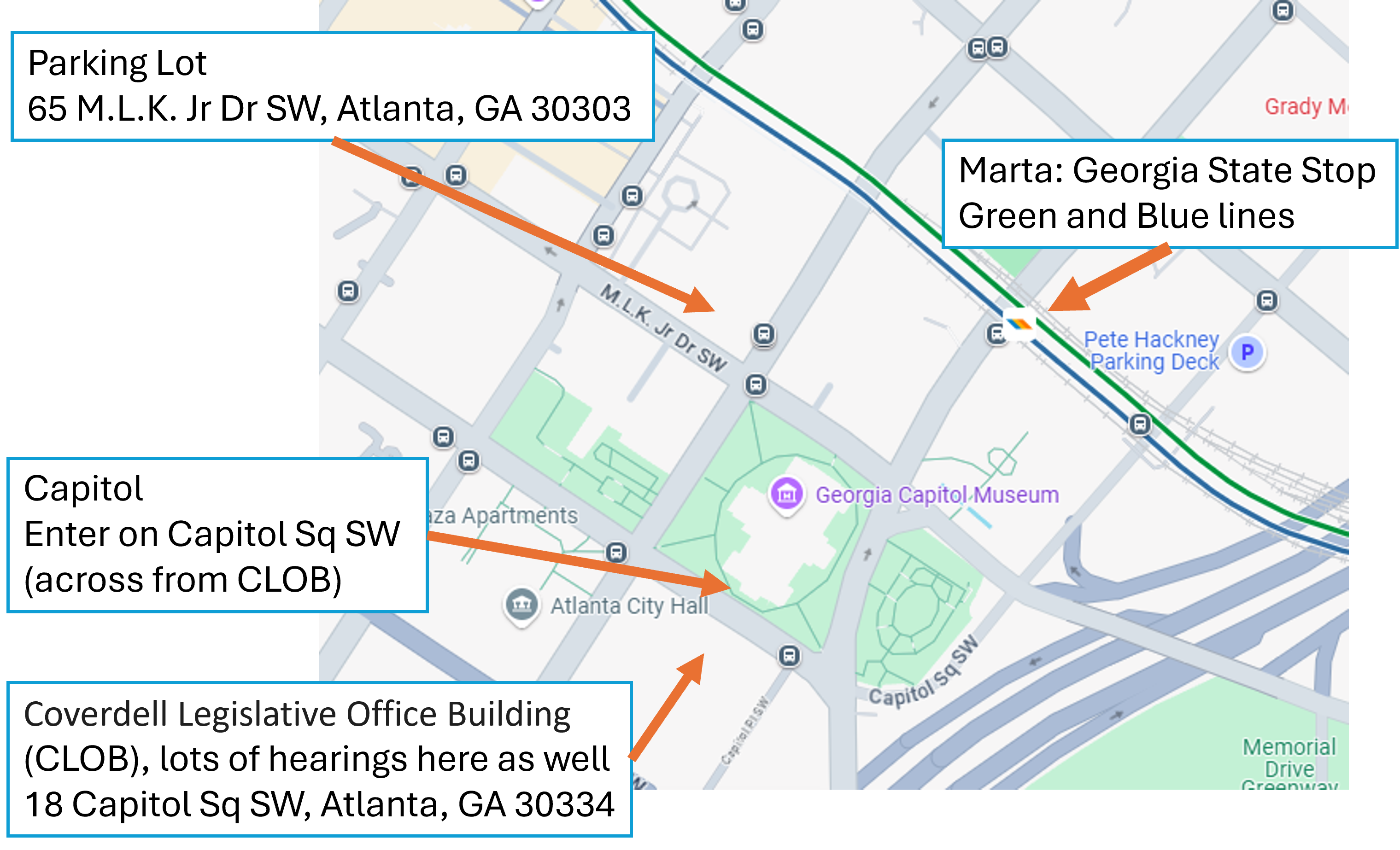
(I had to pay money to park…. and I am not rich, but it made me feel better to know that there isn’t some cheap or free parking realistically nearby that I would feel silly for missing out on… or even if there is I didn’t care)
I quickly found Amy in the parking lot and we made our made our way to our first appointment. We would meet with the Georgia Water Coalition for their legislative organizing session, the “morning call”. This meeting took place across the street from the capitol. I met people and shook hands and followed what I could follow of their inner workings as they prepared for another day of advocating. Most of the advocating effort was for a bill that would protect the Okefenokee swamp. There was a lot of support for this bill, and it was a long time in the making. So they were quite immersed in this battle and the language of this battle. I didn’t understand that much of what they talked about.
But nobody expected me to have prior knowledge of their inner workings and language. Everybody in this meeting was very friendly and welcoming to me, the outsider, and no conversations made me feel silly for not knowing something. I was clear about who I was and what I knew. So that’s lesson three.
Lesson three: be honest about what you don't know. It's okay. You don't have to contribute to every conversation, just wait for appropriate moments and ask for clarification.
Walking into the Capitol for the first time, you might feel like everyone knows what’s going on except for you. The rapid-fire policy discussions, the acronyms, the legislative jargon—it can all feel like a different language. It’s easy to get caught up in the fear that asking questions will make you look inexperienced or out of place. But here’s the truth: asking questions is not only okay, it’s essential.
During one of my early meetings, I found myself in a room with advocates from the Georgia Water Coalition. They were diving into discussions about water policy, legislative strategies, and technical terms I had never heard before. It was one of those moments where I had two choices: I could nod along, pretending to understand, or I could speak up and ask for clarification. I chose the latter, and it made all the difference.
Instead of being met with impatience or judgment, I was greeted with enthusiasm. The advocates were more than willing to explain the nuances of the policies they were discussing. They broke down the legislative process, gave context to the issues at hand, and even provided historical background on some of the key challenges facing Georgia’s water resources. Far from making me feel like an outsider, asking questions made me feel more connected to the conversation. It showed that I was engaged and eager to learn, which, in turn, made the advocates more eager to bring me into the fold.
The reality is, no one expects you to walk into the Capitol and know everything. In fact, most of the people working there—legislators, staffers, and advocates alike—are constantly learning. Laws change, issues evolve, and no one has all the answers. Asking questions is not a sign of weakness; it’s a sign that you’re invested in the process. It shows that you care enough to want to understand the complexities of the issues you’re advocating for.
But this was merely basecamp. We had not climbed this social anxiety Mount Everest yet. By social anxiety Mount Everest, I refer to entering the State Capitol while in session and attending meetings. I couldn’t remember much from the schoolhouse rock or from social studies / political science / whatever you wanna call it class about government. Especially not state government. Surely, once inside, someone would say to me at some point “hey take the left door if you are a platernorian and take the right door if you do not abide the signalled dialectic” and then I would pretend to understand what was just said to me and would walk through one of these doors only to have a room full of people look at me bewildered and they would ask me if I had prepared my speech, which of course I would say yes, brushing this off so as to not appear unprepared and I would agree to take the stage immediately as they offered, so as not to appear rude or ungrateful, and on the way up someone would offer to let me borrow their wig to go up on stage. Oh right I forgot to mention they will all be wearing horrible old powdered wigs and long sorcerers robes. And I would borrow the wig and put it on, which would be convenient because by this point all of my hair will have fallen out and I would take the stage and be forced to fake my own electrocution immediately upon touching the microphone, and then from there I would simply need to convincingly suppress the rise and fall of the breath in my chest until the medics had removed me from the building in disgrace. I would awaken in the ambulance and tell them to drop me off around the corner, to avoid the steep fees.
Anyway, none of that stuff happened.
Which brings us to lesson 4.
LESSON 4: it's fine, don't panic.
So anyway, we went across the street into the Georgia State Capitol. But we didn’t go into some official session of formal speeches and gavels. We just had a quick little meeting with a legislator that Amy had been texting.
LESSON 5: Legislators text sometimes.
So we went through security into the actual capitol building, where the senator’s office was.
To enter the Capitol you need a valid photo ID.
The inside was what you might expect of a law office: lots of white painted walls and decorative wood of various shades at the borders. The senator himself was … and I don’t often say this kind of thing …. a pretty chill dude. He offered us a coca cola twice. You might think he was a little like a kid whose parents had just become rich and moved into a mansion. This was a new office for him, and he wanted to show us the cool new shiny things. It was kind of cute. His office had lots of personal items and Georgia Bulldogs memorabilia. I sat on the sidelines while Amy had her conversations with the Senator plugging the things she cared about, and I sat and listened. But it was just very brief, we had to be on the way to our next meeting.
Lesson 6: there are plenty of snacks??
We went to the cafeteria. You see there is a great affordable cafeteria for the people at the capitol. You don’t need any special qualification to get in. But any weapons you are carrying will likely be confiscated at the security checkpoint at the door. It is a lunchroom style cafeteria with little happening in the way of frill or fancy. It might be one of the cheapest lunches that are available in the entire city. I got coffee and a granola bar for now.
Lesson 7: Cafeteria is your basecamp
Then we went off to the committee meeting about sustainability and energy. It had a name which sounded fancy and communicated that it was a bunch of people attempting to make a difference with sustainability and renewable clean energy.
Lesson 8: anyone can attend a committee hearing, they are all open to the public.
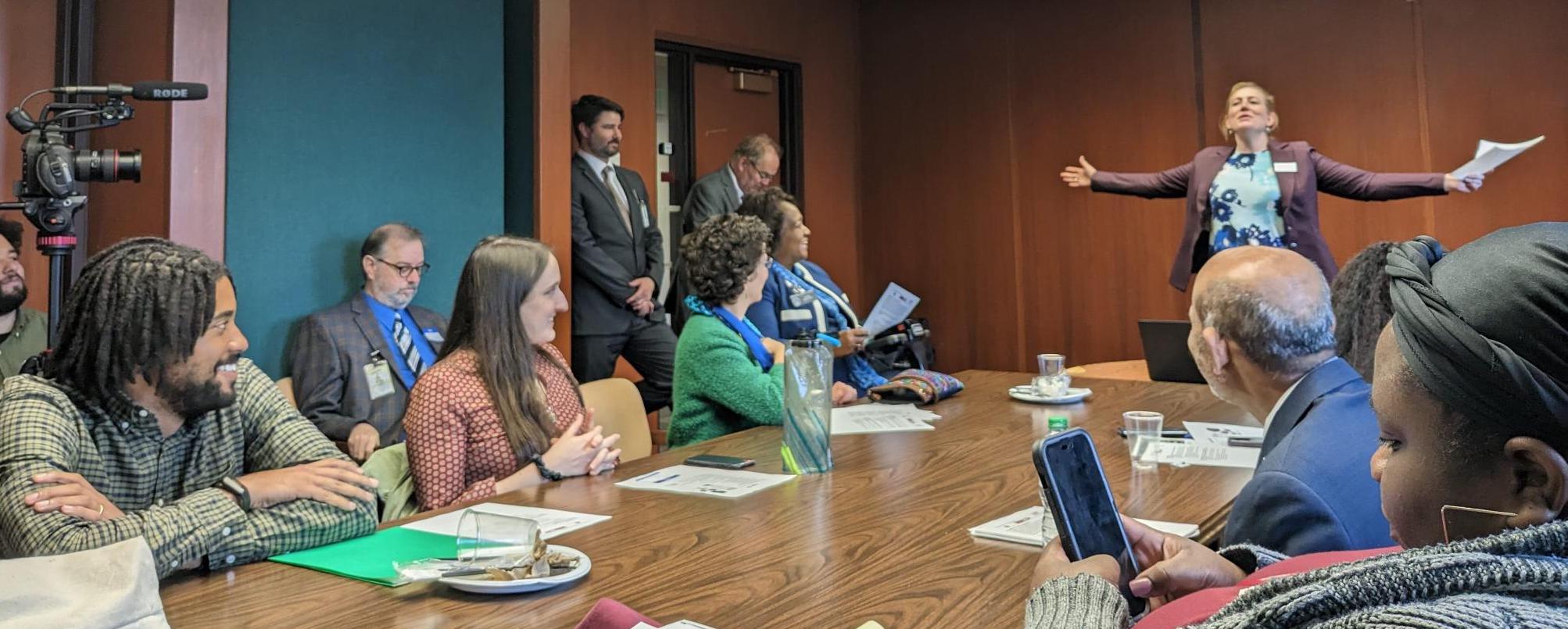
Next meeting was across the little side street from the capitol in a little corporate office room (Editors Note: Coverdale Executive Office Building, CLOB). Again through security checkpoints and up in the elevator. There were lobbyists and legislators in the elevator with us. Just like normal people. I even said hi to one of them. It was a little thrill. But I didn’t let on. I was very casual.
In this meeting various people with similar interests, including state senators and reps all discussed priorities for the coming legislative session. This would put important bills in the minds of the legislators who might fight for them. The language used here could determine the ways that each of these legislators and lobbyists would discuss these issues with other legislators beyond this room. So although it seemed like an echo chamber at first, I think it had an important purpose.
Amy spoke and was quite funny and effective. She spoke about the chicken sludge issue where, because there wasn’t strict regulations against it, industrial farmers were spraying ground up chicken parts across fields in northwest Georgia. I’m not going to get into the details, you can read about it here but just remember: if it isn’t explicitly against the law, it will happen. Thats why it is so important to be here.
Lesson 9: If there isn’t a law against it and someone makes money from it. It will happen.
Also, during someone else’s presentation about the Okefenokee, a question was raised in the audience regarding the proposed titanium mine that we were trying to stop. The question was whether we needed that titanium to help with other renewable energies. Amy stood up and dispelled that information: “the titanium is for whitening paint”. So if she hadn’t been there, misinformation might have spread.
Lesson 10: Conversations happen in the capitol building every day during the session. If we (the people) aren’t providing information, there will be misinformation.
Then on to the next meeting, which was another room in that building.
Okay, hold on. How did I know that these were the rooms and meetings I could walk into as some random citizen? Well, in my case I had an Amy to guide me. But you just have this article. And in the future, when I want to go off on my own and “get involved” with advocating and lobbying for some bill I care about…. How do I figure this out on my own?
Well the biggest thing is you can go to https://www.legis.ga.gov and the first thing you see is the upcoming events.
Pretty much all of these things listed can be attended by a regular person like me. No need for anything fancy like a press badge or a lobbying group to “get me a seat” or something like that. I can just show up. Walk in. Take a seat. Legally.
If you have a bill that you care about that some state representative has sponsored, they can tell you when it is in committee. You see, every bill has to go through committee. The committee will have hearings, to hear about and make decisions about the bill and then they need to vote to pass it on to the WHOLE state house of reps, where they can have a vote. The committee chair can choose to hold no hearings. The committee chair can choose to have no vote. Either way your bill will be dead at that point. So the committee chair is someone with a lot of power over your bill.
If your bill passes vote in committee in the house of reps, then passes a vote on the floor (again, that just means the whole house, not the committee). And then it goes to the state Senate, where the process starts again. They have to vote it through another committee, and then the whole Senate (floor) has to vote it through.
The above is for a bill that started in the house of reps. Your bill might start in the Senate, which just means it would have to pass through the Senate and then the house, so the order is reversed, but same process.
Then at the end of the day, the governor has to sign the bill. The governor can veto. The governor is very powerful.
ALL these things have to happen in the ~3 months the legislature is in session. If it fails, then better luck next year.
Read all about the process and terms here.
Check out “Going to the Capitol” and the bottom of this page: Learn to Advocate – Science for Georgia
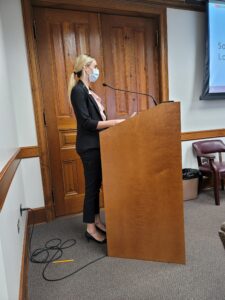
Lesson 11: If you are there to support a particular bill, look up where it is in the process ahead of time and who is going to be voting on it. Thats who you might want to talk to.
It’s a good thing I just explained all that, because next up was a committee hearing regarding literacy. A committee hearing needs to happen for a bill to be voted on and continue the process. So this would not just be a handful of like-minded folks agreeing about our needs in energy. Setting goals and agendas. This is a place where a diverse group of state senators might be at odds with one another. This is where the actual battle happens. I was ready for a show.
I was startled as we began with a prayer. My face shrank in confusion. Subcommittee chair Billy Hickman introduced Sen. Shawn Still who requested that we bow our heads. I looked to Amy. I expressed visual pain. She understood my question silently.
The question was: Why?
She wrote onto her notepad one sentence “every hearing starts with a prayer”
My expression did not change from pain. I was pained.
Then she erased that sentence and wrote another
“This is Georgia”
I looked around the room. Look at these wooden bench seats. My goodness we are sitting in little pews. These special panelists at the front of the room are administering priests.
We’re in church.
This last part isn’t really super relevant, but it’s not bad to remember the foundations of a lot of our political systems rely on a very (white) Christian past. The present is maybe not as different from the past as you might think. Be prepared for it.
So anyway, I cooled off about the whole church thing. I’m not here to figure out how to separate church from the cold dead fingers of this state. Only God has that power.
Lesson 12: know your audience.
We watched as a good communicator, Sonny Perdue, talked about evidence-based best practices in literacy education. Now I understand why Amy uses those words so much “evidence-based”. That’s the language of the space. Thats the language of this realm. That’s something these senators and reps hear and understand. “Evidence”.
It looked like these people, the representatives, were listening. They were asking questions. It wasn’t the circus of doubt and edgy responses that I was expecting. Experts were talking to them and they were listening. They looked from their packets of handout information and to the slides on screen and back to their packets, making sense of what they heard.
Then we heard bad communicators talk about literacy. I won’t name them, but I saw a lot of graphs that I wasn’t sure why or what I was supposed to gain from them. Their vocal cadence had no melody, no way to guide my brains towards any kind of emphasis or drama. “I’m sure they are doing great and important work” I said to myself. But they didn’t sell it. One senator was near sleep. I texted with various people and wrote half of this article on my phone in the meantime, since I could not personally gain anything from this speech.
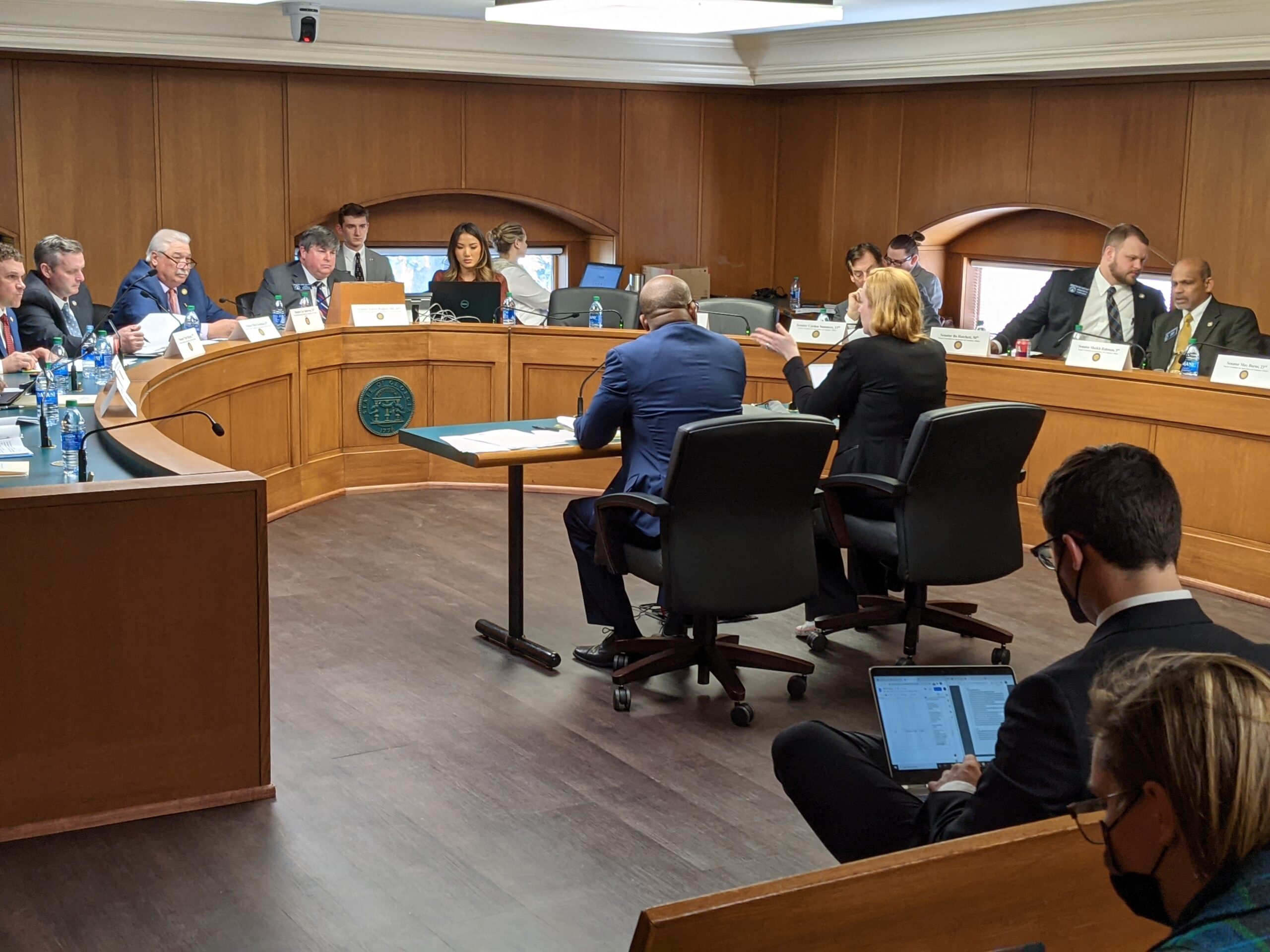
Lesson 13: Work with communicators like Science for Georgia so you get your point across.
Is this how these people make their decisions? Are their minds already made up? Or are they just deciding nonstop every day? Making judgment calls?
I imagined myself. Rolling out of bed after getting caught up watching Love is Blind a bit too late. I catch up on what emails have piled up during my sleep.
Oh by the way I’m imagining myself as a rep. Picture it with me. I’m people! I could be your representative next!
Okay so rep Mike finishes catching up on emails, goes to work. I get just a few minutes at my desk which is covered with bills I need to decide how to vote on. I haven’t read half of them yet and it’s meetings and handshakes and a full day and I land at my fifth meeting and that one is a vote in a committee. Ugh wow yeah it’s a hearing. What am I voting on this time? So many bills. I just don’t wanna embarrass myself. I’m supposed to be a representative. I want to do what’s right for the people. I gotta seem like I know what I’m voting for and I can defend the votes I’ve made. I don’t wanna end up embarrassed, or putting in a vote that will be used in a smear campaign by my opponents when I try to get reelected. No, I’m gonna listen to what I just heard from 5 lobbyists in the hallway on the way in.
THIS is when you get them. In the hearings and right before the votes. This is what the lobbyists know already. This is what we are up against.
Sure, some reps and senators already have their mind made up already. But there are so many bills and so little time. And here, it isn’t clear that “red” or “blue” will tell you what to expect in a bill.
Anyway, the hearing ended and we decided to bail on the ensuing mingling and handshaking to head to Amy’s meeting with her own rep. Senator Jason Esteves. But oh no! The boring bad communicators had put my poor leg to sleep. I nearly fell into a pile onto some lobbyists sitting in our row (pews) as we left. But I didn’t, and we made it out safe.
Lesson 14: dont fall down
We passed very inviting offices of senators. One had porcelain dogs outside the door. Woof woof. Very inviting, and we learned from a legislative aide/intern type person in Jason Esteves office that the dog office apparently had the best snacks. These people seem to be quite living peacefully.
The senator entered the room and was a delight. He sat in a velvety chair that was too small for his tall frame (this was stated vocally by everyone in the room but me) and he said he liked it “it’s like the chair is hugging me”. So anyway he was likeable. He quizzed us on the lobes of the brain and we didn’t even get close. That’s for surgeons and neuroscientists to know. Amy and I are some other kind of scientists. Right now, we know about the Okefenokee swamp and chicken sludge and water quality and literacy and legislation. But before we got there, the other page arrived from a hearing for SB1 (that means senate bill number 1) which apparently would make it impossible to impose any covid related restrictions on anything anymore in the whole state. No safety measures, nothing. Just naturalists and tin hats hoping their determination will keep them safe. I mean sure, covid isn’t the main emergency in this society anymore in January of the year 2023, but this isn’t smart. What if a devastating new variant of the virus comes out? The legislative page said that there were no experts in the room at the hearing to voice any scientific or public health viewpoints. And that they voted to passed it forward 7 to 3. Committee over, bad bill wins. Health loses.
Would it have gone differently if somebody had been there to speak up in opposition?
I ask Amy later whether she would have stood up and said something in that hearing and she immediately said yes. She knows that it is an appropriate thing to do. She knows that you don’t get removed for speaking in that environment. I did not know that.
These things matter.
Anyway, in the interest of transparency I should admit that these events actually happened over the course of two days at the capitol. I just wrote this way because it seemed more compelling. But the events and experiences are true.
In conclusion
What did I learn? The world of politics is still a scary place. It pays to stay tuned in and know your stuff. But I feel that I could return comfortably. I could go back and try to catch a specific state rep in the hallway, maybe they would brush me off, but I wouldn’t feel silly for it.
I would return under the guiding principle “be yourself and be honest”. Be honest about what you know. Be honest about what you don’t know. Someone will be happy to explain it to you. And don’t say some confident things out loud if you aren’t sure. Be ready to back it up.
I feel that if I were paid to come back and try to influence a bill to get passed, I could maybe make a difference. I would ask other people about what bills they care about, who is concerned with my bill. I would feel comfortable going up to a state rep and saying “I want to talk to you about hb71” and then going and doing that. I would have to do my homework to make sure those conversations were productive, but it’s a thing I feel I can do.
This is empowering in a world where the circus of politics feels to be out of my control. Out of control of my friends, my family, and all the people I know standing on the ground wanting things to change. We feel that all we can do is just pick “between the lesser of evils”… or abstain from voting altogether after too much abuse. Where we are not inspired to expect change. Here, at the state level, change might happen. Here is where we can do something. And yet here is exactly where the average person is not focused. That needs to change. If we are going to hold off the endless river of new industrial schemes from consuming the natural world and spitting out some cancerous treated nightmare for us to try to make our lives in, we need to stay involved.

